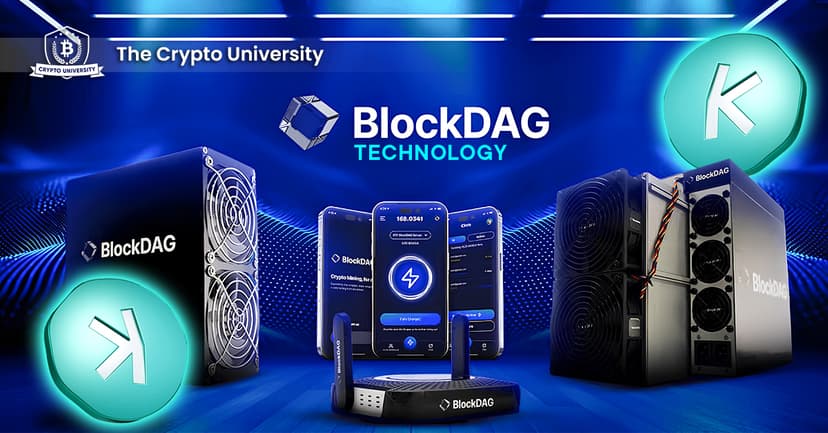No Adverts are available No Adverts are available
No Adverts are available
Kaspa Blockchain: Revolutionizing Cryptocurrency With BlockDAG Technology
Sajal Sharma • 19 July 2024
 No Adverts are available
No Adverts are availableIn the ever-evolving world of cryptocurrency, a new player has emerged that promises to reshape the landscape. Launched in November 2021, Kaspa is an innovative blockchain project that aims to be the fastest, most scalable Layer-1 network in the world while maintaining the decentralization and security features that made Bitcoin famous. Let's dive deep into what makes Kaspa unique and why it's garnering attention in the crypto community.
What is Kaspa?
Kaspa is a decentralized, open-source, layer 1 cryptocurrency built on a novel structure called Block Directed Acyclic Graph (BlockDAG). Unlike traditional blockchains that reject competing blocks, Kaspa's GHOSTDAG protocol allows these blocks to coexist and be ordered through consensus.
Key features of Kaspa include:
- Proof-of-Work (PoW) consensus mechanism
- BlockDAG structure for parallel block processing
- Open-source development with no central authority
How Kaspa Works
At the heart of Kaspa's innovation is the GHOSTDAG protocol. This allows the network to achieve faster transaction processing—currently at one block per second—with minimal confirmation times. The BlockDAG structure enables multiple blocks to be created and processed in parallel, rather than sequentially as in traditional blockchains.
Some key technical features of Kaspa include:
- Incorporation of "orphan" blocks into the chain
- A novel greedy algorithm for block ordering
- Reachability for DAG exploration
- Block data pruning
- Simplified Payment Verification (SPV) proofs
- Future support for subnetworks, paving the way for layer 2 solutions
Solving the Blockchain Trilemma
One of the most significant challenges in blockchain technology is the so-called "blockchain trilemma"—the difficulty in achieving optimal levels of security, scalability, and decentralization simultaneously. Kaspa aims to tackle this head-on:
- Scalability: Kaspa's BlockDAG structure allows for high transaction throughput, with plans to increase block rates to 32 per second and aspirations to reach 100 per second.
- Security: The project maintains a strong security model through its PoW consensus mechanism and advanced cryptography.
- Decentralization: With a fair launch and no pre-mining or pre-sales, Kaspa ensures a level playing field for all participants.
Tokenomics and Fair Launch
Kaspa's approach to tokenomics mirrors that of Bitcoin:
- The project is completely open-source with no central authority.
- There was no pre-mining, pre-sales, or allocation of coins.
- A predetermined maximum supply of 28.7 billion KAS tokens has been set.
This fair launch approach ensures that all participants have equal opportunities within the Kaspa ecosystem.
The Kaspa Ecosystem
Despite being a relatively young project, Kaspa has already developed a growing ecosystem:
- Wallets: Options include desktop, mobile, and hardware wallets.
- Kaspa Explorer: A utility for tracking network metrics, supply data, mining information, and market data.
- Kaspa Graph Inspector (KGI): A tool for visualizing and analyzing the Kaspa blockchain.
- KasBoard: A monitoring toolset providing in-depth network analytics and real-time visualization of the Kaspa BlockDAG.
- Kaspa Ecosystem Foundation (KEF): An organization supporting the development, adoption, and sustainability of the Kaspa ecosystem.
Current Limitations and Future Developments
While Kaspa shows great promise, it's important to note its current limitations and future plans:
- Smart Contracts: As of July 2024, Kaspa does not offer native smart contract functionality. However, the team is actively exploring implementation options, including a potential hybrid solution using Rollups technology.
- Ongoing Development: The project is focusing on rewriting the node in Rust to enhance efficiency and robustness.
- Future Rollouts: Plans include increasing block rates, implementing subnetwork support, and attracting more decentralized applications (dApps) and DeFi projects.
Getting Started with Kaspa
For those interested in joining the Kaspa ecosystem:
1. Choose a Kaspa wallet that suits your needs (desktop, mobile, or hardware).
2. Acquire KAS tokens through cryptocurrency exchanges where it's listed.
3. Explore the growing ecosystem, including the decentralized exchange (DEX) and emerging dApps.
4. Developers can find resources for building applications on the Kaspa blockchain at kaspa.org.
The Road Ahead
Kaspa's unique approach to blockchain technology positions it as a potential game-changer in the cryptocurrency space. Its focus on solving the scalability issue while maintaining security and decentralization could make it a strong contender for widespread adoption.
However, challenges remain. The project must continue to innovate, attract developers and users, and successfully implement smart contract functionality to compete with established blockchain platforms. The cryptocurrency landscape is highly competitive and ever-changing, so Kaspa's success will depend on its ability to deliver on its promises and adapt to market demands.
Conclusion
Kaspa represents an exciting development in blockchain technology, offering a fresh approach to scalability through its innovative BlockDAG structure. While it's still in its early stages, the project's commitment to solving fundamental blockchain challenges and its growing ecosystem make it a cryptocurrency worth watching.
As with any investment in the crypto space, potential users and investors should conduct thorough research and consider the inherent risks before participating. Nevertheless, Kaspa's unique proposition and active development suggest a promising future for this innovative blockchain project.
Share Posts
Copy Link
cryptouniversity.networkblog/kaspa-...

Grey Jabesi • 21 February 2026
Welcome to the Crypto Winter: 3 Signs We’re in a Bear Market (And How to Survive It)
Bitcoin has plunged nearly 50% into a deep crypto winter bear market. Discover 3 key signs confirming the downturn and essential survival strategies for traders in 2026.

Grey Jabesi • 1 January 1970
Anatomy of a Crash: 3 Key Factors Driving Crypto into a Deep Winter
Explore the 3 key factors—macro liquidity tightening, institutional selling, and fading narratives—driving the current deep crypto winter and what it means for Bitcoin and altcoins recovery.

Grey Jabesi • 31 January 2026
The Walls Are Closing In: What New US Crypto Legislation Means for Your Portfolio
New US crypto laws advance in 2026 with White House summit, Senate bill, and SEC clarity on tokenized assets. Discover what this means for Bitcoin, DeFi, RWAs, and your investment portfolio.